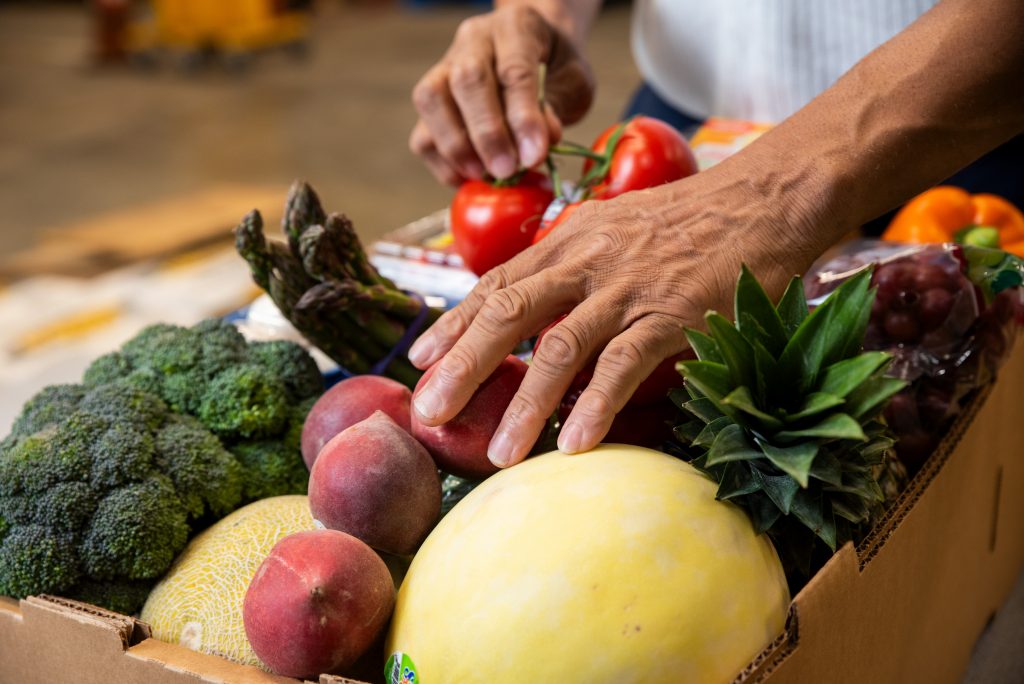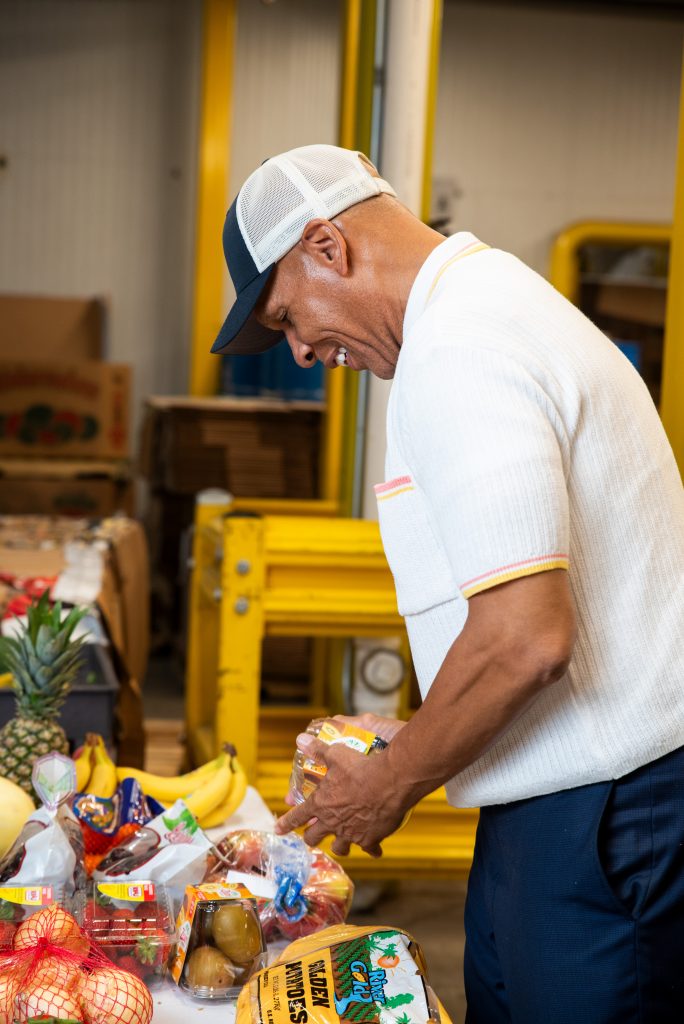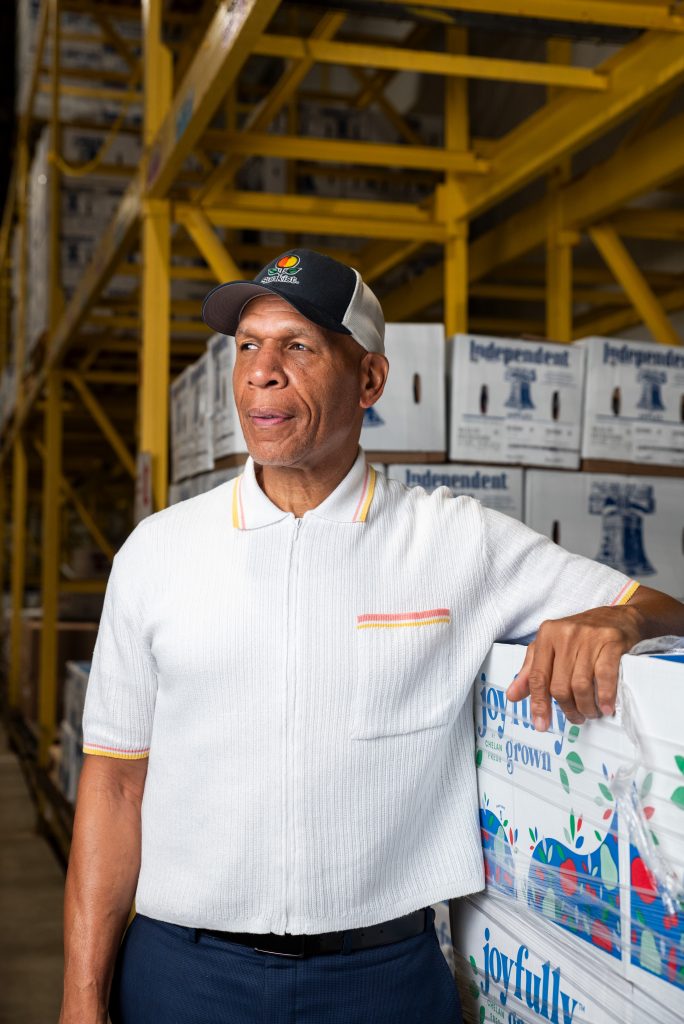For 28 years, the founder of ‘Basket of Love’ and ‘One Man Stands’ has remained steadfast in his commitment to spreading love, kindness, and tolerance.
By Ervin Dyer
In the mid-1990s, Joseph “Joe” McCain Jr. was a young man settling into life on Pittsburgh’s North Side. He had a good job as a buyer with a produce company, an apartment in the picturesque and charming Mexican War Streets neighborhood, and the former college athlete enjoyed his all-Black rowing club and biking.
Yet, he looked around and was dismayed by the number of men and women who were living on the streets and under bridges. Having experienced being unhoused as a young adult, McCain identified with their struggles, and he decided to do something about it.
He launched a one-man mission. Using his own resources, he found sales, shopped for gently used items at second-hand stores and purchased coats, sweaters, and other materials to get Pittsburgh’s citizens without housing through the rough winters.
His mission has now stretched on for 28 years. In the course of that time, McCain’s heart for service and community building has only grown in distinctive and selfless ways. He’s started a holiday food giveaway and created unique awareness campaigns to battle breast cancer and promote tolerance of others. Along the way, he’s been named a New Pittsburgh Courier Man of Excellence, earned Black history honors from a local church, and been recognized with the Good Apple Award for his community work. Yet, he remains humble, self-reflective, and focused.
“I don’t do this for notoriety,” said McCain. “I truly want people to embrace each other, eat healthier, live better and exercise kindness.”
Not long into the summer of 1997, when he began his outreach to those without homes, he soon asked them what they needed. They told him instead of coats, they wanted gloves, socks, and hats. So, this is where McCain focused his purchasing. He was out four or five days a week, distributing items in downtown, Homewood, the Hill District, and even reaching areas as distant as Jeannette. His friends and coworkers noticed, and gifts began to pour in. He received donations from Dubai, businesses wrote checks, and friends helped him to pass items out. It was needed. In the years he’s been doing the work, McCain said he’s noticed the street population grow: more women, more younger people, veterans, the mentally ill, and working people. Some seasons, he estimated, he’s delivered 600 or more sets of hats and gloves.
About 12 years ago, McCain came up with the idea that he could provide a few boxes of fruit, dry goods, and canned food to feed families of four for a week. He connected with the growers and food suppliers he knew. His employer supported the idea. A company donated boxes. Truck drivers volunteered to deliver.
Soon, food and products flooded his home. That first year, he tried to pack it all himself, staying up from a Friday evening to Sunday morning. He soon connected with Park Place African Methodist Episcopal Church in Homestead, which gave structure to the giveaway. Park Place told the Baptists, the Catholics, the Jewish, and the people came. McCain had planned for 85 families, but he gave away 650 boxes that first year.


In 2024, Joe McCain’s “Basket of Love” initiative gave away 3000 boxes of food and produce to families during the winter holidays—enough to last them for a week. Photo credit: Kitoko Chargois
It’s only grown over time. Last holiday, 2024, “Basket of Love” gave away more than 3,000 boxes. And it’s become a holiday fellowship that draws the young and elderly, police and faith leaders, sororities, and professionals. During the height of the Covid pandemic, distribution sometimes doubled. McCain said the value of what has been given away equals more than $1.7 million.
One of those helping McCain at Park Place Church is Betty Esper, the former mayor of Homestead. She’s known “Joey,” as she calls him, since he was a little boy and a neighbor. “He’s the hardest-working and most generous man I know,” she said.
Five years ago, when Esper was still mayor, she gave McCain a Humanitarian Award from the city. “He’s always around doing something, fixing up the playground, taking food to seniors in the high rise. I wanted him to come back home and run for mayor,” she said.
For five years, the holiday giveaway partnered with former Pittsburgh Steeler Charlie Batch and his charity “Best of the Batch” to give toys along with the food.
Batch and Park Place AME Church are both significant to McCain. They draw upon his roots in Homestead, a hard-scrabble steel town west of Pittsburgh. McCain grew up there. It’s where he took on the nickname “Cheese” (because he was always smiling) and where he began volunteering as a teen, teaching kids not too much younger than himself to breakdance and aim higher in life. But Homestead is also where he first saw the power of giving, developed his spirit of service, and absorbed the importance of community caring for each other.
He was the only son of three children of Joseph and Dolly McCain. A younger sister passed away from complications of cerebral palsy at 4, and his mother died from multiple sclerosis in 1993. She was in her 50s. When she couldn’t get to worship at Park Place, the minister brought the worship to her. When she needed full-time care and was waitlisted for a nursing facility, Esper was able to use her influence to get her admitted.
I thought this would be a good way to promote love, peace, unity, and solidarity. I wanted to create a space where no one felt threatened. To have a place of Big Ears and Little Tongues.
Joe McCain
McCain never forgot this compassion extended to his family. “If my mom hadn’t been able to get into the facility, she probably would have passed away within six months,” he said.
McCain’s father served with the Air Force and the family lived for a while in Washington, D.C., where he worked for the Equal Employment Opportunity Commission and the Internal Revenue Service. His father had a strong sense of social consciousness. He recruited Black graduates of HBCUs into the federal government. When he worked at the federal building in downtown Pittsburgh, in 1975, he was one the first employees to lobby for an African art exhibit for Black History Month.
After 25 years with the government, he earned a nursing degree and worked at West Penn Hospital. In Homestead, he did his neighbor’s tax returns for free.
In the 1980s, the family lost their home, and McCain, then about 20, went without housing for two years. To fill his time, McCain hooped at streetball. Athletic and competitive, he was spotted by a coach and offered a scholarship to play for Community College Allegheny County – Boyce campus. In two years, he scored 1,200 points, led the team in a national competition, earned “Fabulous Five” recognition from the local newspaper, and won all-American honors.
At the same time he was playing basketball, McCain was also working 40 hours a week at a deli in the Squirrel Hill neighborhood of Pittsburgh. Between work, getting to school, which was in Monroeville, and getting to ball practice and home, he’d sometimes have to catch six buses a day.
His tenacity paid off. After playing with CCAC, he received a scholarship to Pitt-Johnstown, where he studied business.
“I was happy,” he said, “the opportunity took me from Homestead, which was being hit hard by crime and cocaine at that time.”
When he was finished with Pitt, he stayed with his older sister for a while, helping to raise his nephew before finally settling on Pittsburgh’s North Side, where he’s lived for more than 20 years.

When George Floyd was murdered by a police officer in May 2020, it shook McCain. He wanted to do more. He conceived of what he called “One Man Stands,” solo public vigils that he uses to promote tolerance across differences and to advocate for breast cancer awareness.
McCain’s friend constructed a platform featuring four pillars. Each pillar was flanked by a set of balloons, representing first-responders; LGBTQ community; Black Lives Matter, and the red, white, and blue for the United States. At the front of the platform rested his father’s military flag.
In September 2020, McCain took the platform to the North Shore, where he stood for 10 hours a day for eight days and 46 minutes, representative of the eight minutes and 46 seconds the police officer had his knee off Floyd’s neck. He stood on the platform rain or shine. When the stand was vandalized, he put it back up. Friends and strangers came to support him. The Pitt swim team came, his employer paid coworkers to stand with McCain, Trump supporters showed up, and news media reported on the vigil.
“I thought this would be a good way to promote love, peace, unity and solidarity,” said McCain. “I wanted to create a space where no one felt threatened. To have a place of Big Ears and Little Tongues.”
Alan Siger was owner of Consumer Fresh Produce when he hired McCain as a worker some 30 years ago. For a long time, McCain just did what he did without telling anyone. Siger said that when he found out about McCain’s work in the community, he was “happy to help.” He allowed McCain time off, he supported projects financially, and he rallied donations and volunteers.
I don’t do this for notoriety. I truly want people to embrace each other, eat healthier, live better and exercise kindness.
Joe McCain
“He’s just an amazing individual,” said Siger. “He’s one man trying to increase visibility on so many issues.”
In the fall of 2021, with the tolerance vigil, McCain stood for 24 hours at the Homestead Grays Bridge. Once the thousands of cars had passed and night fell, the toughest part was the silence, he said, “when he heard nothing but the river flowing.”
Four years ago, in October, he began a vigil for Breast Cancer Awareness, showing women that they are not standing alone and there are men who support, honor and care for them. The vigil was populated with pink balloons, pink lady apples, and pink smiley cookies from Eat N’ Park. He drew support from the Susan G. Komen Foundation, Batch, Lynn Swann of the Steelers, and many others. He took the vigil to Homestead, the Strip District, and the grounds of the Little Sisters of the Poor.
Esper recently turned 92. “If Joey needed me to stand with him tomorrow,” she said, “I’ll be there.”
McCain has met Presidents Barack Obama and Joe Biden and Vice President Kamala Harris and other noted politicians, as a driver in their motorcades when they’ve visited Pittsburgh, but his greatest work, he said, remains in trying to get people to feel good about themselves.
“If people hear your music and gravitate toward you, that’s good,” he said. “If they don’t hear you, don’t be afraid to stand alone.”
Ervin Dyer is a writer who focuses his storytelling on Africana life and culture.


